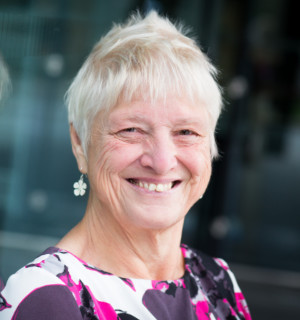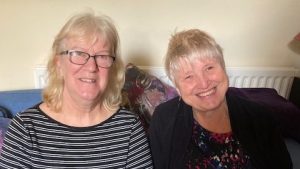 Kay Sambell and Sally Brown
Kay Sambell and Sally Brown
Welcome to 2023 and here Kay and I would like to give you a kick start if your New Year’s Resolution is to spring clean your assessment strategy! We start with what we hope is a convincing case for moving in this direction, without chucking out all your old assessments and starting from scratch. We all know that New Year Resolutions that really stick don’t work like that, but rather by gentling nudging us into better practice. A key feature of this post is what we believe is a really useful Table of alternative assessment outputs, giving diverse examples of how you can use these more authentic assessment approaches and what each is particularly capable of achieving. Let us know if you find them helpful.
The article below is long, and can also be read as a word document as attached here:
Authentic-assess-blogpost-f1.docx (2126 downloads)
Also attached: the QQI (Ireland) handout:
QQI-handout.docx (2348 downloads)
Introduction
Assessment for learning, (AfL), is now regarded in many quarters as being beneficial for student learning and engagement, and a key part of this is making assessment activities more authentic and future-facing. For some time, we have been arguing that alternative or innovative assessment tasks can have a key part to play in creating effective Assessment for Learning environments in higher education (Brown and Knight, 1994, Sambell et al, 2013). Assessment for Learning (AfL) is
“when all assessment contributes to helping students learn, both within the university university, but also well beyond it in the longer term… From this perspective, assessment, teaching and learning are closely related, with each one being part of the pedagogical process, and where feedback is used to adjust the learning cycle” (Villarroel et al, 2018).
This blog aims to spark reflection and conversations about the diverse range of alternative assessment tasks we might set to encourage students to become energised and engaged in the kinds of deep, lasting learning that characterise higher education and stand them in good stead in the longer term, once they graduate. We also hope that the illustrative examples table at the end will provide useful to others who want to move towards more authentic assessment.
Whilst AfL includes formative assessment – whereby learning intentions are clarified and shared, evidence of learners’ current progress is elicited, and feedback that moves learners forward towards intended achievement is provided (Wiliam, 2022) – it is also a broader concept. In Higher Education this importantly includes the motivating aspects of assignments which students experience as relevant beyond the immediate context of gaining marks and progressing successfully through their programme of study. This feature, which inherently involves tasks which, for example, link knowledge with life beyond the university classroom, or encourage students to apply knowledge in an analytical and thoughtful way to solve a problem or meet a need, is typically referred to as authenticity. Creating assessment tasks which are underpinned by this core condition of AfL (Sambell et al 2013) is the focus of this paper.
What is authentic assessment?
There is an extensive and longstanding body of scholarly work on the value to, and impact of, authentic assessment on learners (see for example, Wiggins 1990, Gulikers et al 2004, McDowell and Sambell 1998, Davison 2007, Ajjawi et al 2019, Hobbins et al 2022). Several influential reviews of the extant literature on authentic assessment have synthesized complex, multi-dimensional models of authentic assessment, highlighting a range of inter-related underpinning characteristics or core dimensions (e.g. Ashford Rowe, 2014; Villaroel, 2018). Yet others have analyzed research into the benefits of authentic assessment for students (Sokhanvar et al 2021, Sotiradou, 2019).
To some degree most of this scholarly work has tended to promote an understanding of authentic assessment in HE as involving what are often labelled ‘real world tasks.’ Interestingly, too, the sense of ‘realism’ referred to in this body of research is typically conflated with the world of work and employability. For instance, Villarroel et al (2018), notably frame authentic assessment as follows:
“Authentic assessment aims to replicate the tasks and performance standards typically found in the world of work, and has been found to have a positive impact on student learning, autonomy, motivation, self-regulation and metacognition; abilities highly related to employability.” (p840)
In one sense this is unsurprising, given that Villarroel and her colleagues note that authentic assessment began as a response to mitigate some criticisms levelled at higher education, namely, for instance, that students often experienced difficulty in applying their disciplinary content knowledge to different contexts, or struggled to adapt to the complex demands of working life on leaving university with under-developed basic skills and abilities, such as problem-solving, critical thinking, teamwork or communication. Given this context, authentic assessment was endorsed as the opportunity for students to practice skills and competences that they would be expected to exercise in their future jobs, as well as building capabilities that are part of employability such as: coping with uncertainty, working under pressure, planning and thinking strategically, communicating and interacting with others. It is also unsurprising that much of the early empirical research took place in subjects with a strong professional or vocational orientation (e.g. Gulikers et al, 2008).
From this standpoint Villarroel et al (2018) proposed the conceptual building blocks for designing authentic assessment should include:
- Realistic tasks that engage students with problems or important questions that are relevant to everyday life beyond the classroom;
- Cognitively challenging tasks that prompt students to develop and use higher levels of thinking to use knowledge, process information, make connections and rebuild information to complete a task (rather than low-level recall or reproduction of facts);
- Opportunities to develop evaluative judgment and enhance the self-regulation of their own learning (Sadler, 1989) by, for instance, engaging with grading criteria, honing the capacity to appreciate the features of ‘quality’ or excellence in complex outputs and developing the ability to provide, seek and act upon feedback.
More than just employability
More recently, we have seen scholars such as Jan MacArthur importantly and usefully critique the extent to which authentic assessment is necessarily conflated with the world of work and employability. Drawing upon critical theory, MacArthur (2022) helpfully builds on existing scholarship that focuses on ‘real world’ tasks which encourage students to develop and apply the kinds of knowledge and skills that graduates would use in the workplace or professions, by potentially broadening the scope of authentic assessment to redirect it, too, at broader social and political transformative agendas. She argues for
- a shift in focus from the real world/world of work to a richer understanding of society
- a move which transcends a focus on the task, and which considers instead the value of that task
- an understanding of authentic assessment as a vehicle for transformation, not one for reinforcing the status quo.
As part of this endeavour, MacArthur acknowledges the important role that ‘alternative’ or ‘innovative’ assessment tasks (Sambell and McDowell, 1998; Clegg and Bryan, 2006; Sambell and Brown, 2021) might have to play as catalysts for rethinking assessment to enhance a stronger sense of assessment’s relevance in students’ minds.
MacArthur cautions against an over-emphasis on a work/real world focus in conceptions of authentic assessment, which might be taken reductively to imply that we have too much focus on knowledge in higher education and instead simply need to foreground skills and competencies that employers want to see. She notes, too, the aim of our posts (Kay Sambell and Sally Brown: Covid-19 Assessment Collection – Sally Brown Sally Brown (sally-brown.net) during the pandemic:
“A welcome development can be found in the impressive range of examples of authentic assessment compiled by Sambell and Brown (2021). These suggest a return (or continuation) of Sambell and McDowell’s (1998) earlier view of authentic in terms of alternative forms of assessment. Sambell and Brown focus particularly on alternatives to the traditional essay and in this sense helpfully transcend the limitations of a real world/world of work approach that often appears to exclude non-vocational subjects from the realm of authentic assessment.”
In what follows we will provide what we hope will be useful illustrative examples which demonstrate the value of a diverse range of outputs that students can be invited to produce, rather than just the traditional essay or the timed pen and paper exam answer. They are drawn largely from our compendia of authentic assessment (mentioned by MacArthur above.) Acknowledging the value of MacArthur’s broader, enriched view of authentic assessment, we frame this discussion in the light of Lydia Arnold’s recent, highly pragmatic thinking about authentic assessment. Recognising the challenges associated with defining authentic assessment, and especially those that emanate from the routine emphasis that many designers place on ‘the real world’, the world of work or work-based/work-related approaches when designing authentic assessments, Arnold (2022) draws attention to the ways in which others place emphasis, say, on long term personal fulfilment. In her global definition of authentic assessment, she replaces the term ‘realism’ with an emphasis on ‘relevance’:
- Relevant to future employment;
- Relevant to the advancement of the discipline;
- Relevant to our collective future;
- Relevant to individual aspiration.
We welcome her approach whereby authentic assessment often mirrors real, complex challenges; equips students to work with uncertainty; results in diverse outputs; causes students to reflect meaningfully on their learning; focuses on ‘process’ as well as product.
So does this mean throwing out all of our current assessment activities altogether?
Not at all! Many of the ideas we propose here can be incorporated into mixed diets of assessment modes. When you look at the tasks you will see that many can form elements of what you already use; hence some of the outputs might be required within traditional timed and invigilated exams, and some could be modified to fit within the essay format.
Nor do they have to be excessively onerous, because workload can be limited by limiting wordage, duration of presentations, audio and video blogs and overall scope of the task.
Neither do they all have to be summatively assessed, with some, for example blogposts or posters, reviewed in class. And not all have to be tutor assessed, with peer review having an important part to play, placement managers, employers and stakeholders potentially making a contribution, and in some data/numeracy-based tasks, the deployment of computer-assisted assessment working well.
In our four compendia of authentic assessment examples on our blogpost at Kay Sambell and Sally Brown: Covid-19 Assessment Collection – Sally Brown Sally Brown (sally-brown.net) you will see that some entries have up to five different outputs in an overall assignment, but how many of these you use depends on what you’re assessing and what you are trying to achieve.
Conclusions
In conclusion, we suggest a useful step for assessment designers and module teams to consider is to consider asking for or allowing alternative student outputs. Our aim is mainly to raise awareness of the vast range alternative assessment outputs you might consider setting, which can inspire and engage productive student learning, as opposed to routine, hamster-wheel tasks, which signal to many that they are merely hoops to jump through, with little worth beyond being tested and achieving marks, and which consequently result in surface approaches to learning. Alternative or innovative assessments can therefore have an important role, playing a part in designing assessment which seem more relevant to students, particularly those whose cultural and social backgrounds hasn’t equally equipped them to excel in the traditional university assignments requiring a familiarity with unwritten academic mores.
But when you scrutinise these examples, before you adopt or adapt any of them, be sure to ask yourself whether they are fit for your particular purposes and whether they are better than what you already use. These alternative options will only produce more authentic assessment for your students if they are right for your students, right in your discipline and right for your institutional context, aligning with your learning outcomes and adding value to student learning. But if they do, then feel free to modify and make use of them!
A table of alternative assessment outputs
| Alternative output |
Example |
What could this be useful for? |
How could I use/adapt this to use in my context/ discipline? Is it better than what I am already doing? Is it more authentic/relevant? |
| Press release |
Based on your recent research, write a 700-word press release for [a specified news media] in which you summarise the most exciting/ noteworthy aspects of your work. Start with an attention grabbing headline, and then put all the important information in the first section and be sure to include all the important details, including your contact information |
Giving students practice in prioritising key information and writing concisely.
Asking them to consider what might be required in writing in a different genre for a specific audience. |
|
| Individual or group video or audio presentation shown in class or submitted virtually |
Prepare and record a five-minute input segment for the BBC Radio 4 programme Open Book in which you discuss two recently published novels by a 21st Century author published in translation |
Engaging students by asking them to present their recent learning for a specific audience concisely. The time limit encourages them to be concise while making peer or tutor reviewing or marking of the assignments manageable.
Developing their presentation skills which are regarded as key graduate outcomes |
|
| Reflective commentary |
Write a brief note for your reflective diary about what you have learned from preparing for this assignment and what skills you might need to develop to take forward into your future life.
|
Getting students to consider process as well as outputs
Building their abilities to self-review progress and capabilities |
|
| Handbook for equipment |
Prepare a step-by-step handy guide for a junior colleague in the pharmacy team outlining the key steps to set up of domiciliary oxygen (of the cylinder and headset) to enable everyone to have a standardized and safe approach in the form of a hard-copy booklet.
|
Explaining a complex process to a junior colleague: this can be a really valuable way of testing deep understanding of why it is used and how equipment works |
|
| PowerPoint /Prezi presentation |
Produce an illustrated presentation (no more than 20 slides, the last of which should be your refences and sources in an appropriate format) that you would use to run a 30-minute training event with your colleagues. |
Making effective presentations: in many careers/ disciplines/ social contexts the ability to make an informed case is required
|
|
| Individual or group poster, often A1 or can be as a PowerPoint slide, can be group or individual |
Produce a poster for the window display for one of the 21st century novels you have been studying, (presented as a PowerPoint slide) in which you provide an overview of the text and at least three positive quotes from critics about the text to raise reader interest. Your poster should include at least one image.
|
Communicating in visual and textual forms and using digital means. This is often prescribed within the learning outcomes for many programmes |
|
| Leaflet or guidance document |
Prepare a 2-page guide for a kinship carer summarising information based on your pre-readings about rights and responsibilities in a very accessible way to clients that is easily understandable and doesn’t over-promise.
|
Explaining complex information straightforwardly: helping students look at regulatory frameworks from layperson’s point of view is a valuable skill because if you can explain it clearly to others you are likely to understand it well yourself |
|
| Photo essay, story board, Infographic, spider diagram, sketch note |
Work with peers on the VLE to contribute collectively to a group digital mural of images and text depicting health care priorities that are likely to matter most to older people |
Producing visual outputs: this requires students to demonstrate a wider range of skills than text-based approaches can. These can be used across many disciplines. Diverse students can often find this an inclusive approach. |
|
| Digital learning pack |
Produce a digital Learning Pack for use by the public which contains a selection of visually attractive attributed or copyright free photos (including perhaps your own) with key information pages, including, for example, suggestions for further reading, articles from the press and media and other relevant resources together with notes which clearly and concisely outline your view of the impact of this project |
Undertaking life-relevant information retrieval, management and presentation skills, enabling them to support an evidence-based case. |
|
| Summary of evidence including text and visuals |
Produce a crime scene report using information and data accessed during the simulation |
Prioritising and presenting complex data in a systematic and concise way while maintaining accuracy and comprehensibility |
|
| Calculations involving live data |
Using manufacturers’ information and blood test data, calculate the correct dosage of Blood pressure drug required to treat a 70-year-old woman with raised BP readings |
Demonstrating the consistent performance of reliable and accurate calculations as required on professional programmes e.g. M Pharm. |
. |
| Individual or group role play e.g. interacting with simulated patient, legal client etc |
Take a history from the patient/ client that accurately represents the condition/ experiences that have caused them to seek your advice |
Demonstrating good interpersonal and interactive capabilities. Simulations and role play can be excellent precursors to live interactions, especially where there are opportunities to unpack and discuss these interpersonal events. |
|
| Portfolio of evidence from practice |
Produce a portfolio including teaching materials, class observation notes, resources, mentor lesson plans and your reflections on practice. Each item should be concisely presented, numbered and indexed. Provide an overview table/matrix which shows where an item relates to the relevant module learning outcomes. Write a synopsis of no more than 1,000 words which guides the reader through the evidence provided to enable sampling |
Systematically presenting a wide range of evidence from personal practice. Portfolios have traditionally been considered an invaluable way to access off-campus/ individual practice learning but the sheer volume of evidence to review can be daunting unless it is provided in a manageable format. It really helps if you can show students examples of the kinds of output previous students have completed |
|
| Screenshot or hard copy of annotated bibliography |
Provide an annotated reference list, (including at least 2 journal articles or book chapters, at least 2 websites containing digital stories and at least 3 informal sources such as leaflets, posters or blog) which shows the main sources you used to find the information and gives a concise summary of the key message from one paper or book chapter that was important to you in writing your report (full reference list in APA format plus up to 500 words description for your main sources).
|
Developing confidence in finding, recording and managing information. This can be daunting for disadvantaged students with no experience of this kind of task or those who have been extensively supported prior to entry.
Asking students to prepare a limited list of specified resources. Doing this prior to writing an essay or more extended text can help to build this capability rather than asking them to do it for the first time (often badly) and then risking them failing the first assignment |
|
| Article for student newspaper |
Write an article of 700 words for the student newspaper for a wide readership indicating the precautions students living together in shared flats should take in the relation to keeping safe from contamination in the bathroom.
|
Getting students to write concisely for a specific audience
Simplifying complex information for a lay person |
|
| Analysis of live data |
Using the data, you have obtained from the three patients whose cases you have reviewed over the morning, calculate accurately the doses of each medication you would prescribe, taking into account any contraindications for each patient and the potential for any drug to interact negatively with any other |
Requiring students to make calculations of prescriptions with a high level of accuracy.
Demonstrating a good understanding of the properties of the drugs being prescribed |
|
| Grant application, bid for funding |
You represent a community grass-roots organisation that wants to bid for funding for a composting toilet for their community garden and allotment. Download the call for funding bids from the local authority website and draft a fully-funded application that clearly answers all the questions to enable them to be successful in their bid, ensuring every section is completed accurately and is truly representative of the wishes of the organisation |
Demonstrating the ability to make a comprehensive and convincing case against set criteria to maximise chances of success
|
|
| Summary of bullet points of key advice to clients |
Having drawn up the draft documentation for your two elderly clients giving Power of Attorney over financial and personal matters, draw up an A4 bullet point summary of the important aspects of what powers they are giving to executors, in a format they will readily understand. |
Simplifying complex information for a layperson without losing any important details |
|
| Email to line/ manager client giving advice |
Draft a rationale for your line manager indicating whether the six sessions of CBT you are normally allowed is likely to be an appropriate initial treatment for this client and outlining what you might hope to achieve in these six sessions. (up to 500 words).
|
Giving students practice as making a case for a particular course of action
Writing concisely in an appropriate register |
|
| Blogpost |
Summarise your evaluation of three documentary films in the form of a 300-word blog post as if for the International Documentary Association blogsite at https://www.documentary.org/blog.
|
Researching what is required by relevant professional body websites, (which may indeed be published by them)
Writing concisely for a particular context in a non-academic format |
|
| Preparation for a job interview |
You have been invited to an interview for a lead practitioner role in an Early Years setting. As part of the interview, you are required to deliver a presentation to the interview panel on your own ideas for a new approach/ curriculum to be considered for use in the early years. Your new approach/ curriculum should be informed by research into the needs of young children to best support their learning and development.
|
Presenting own perspectives (where there is no right or wrong answer)
Using appropriate literature in the field
Practising life relevant skills |
|
| Data analysis activity |
Analyse the accompanying dataset to determine the nature of the data and identify the optimal method of assessing the stability of the data from this process. Then offer an interpretation of the stability using the method you have identified in Summarise your findings, paying particular attention to recommending corrective action should this be required.
|
Using data as a basis for decision making.
Presenting and interpreting information appropriately. |
|
| Reflective screencast |
Record a Patchwork Screencast Assessment (PASTA) in which you explain and evidence your developmental journey as a teacher throughout the first module of the PGCE, demonstrating how you have engaged with theory, literature and best practice to provide innovation and excellence in the learning and teaching, assessment and feedback and support of your students. You should describe how you have developed as a teacher and highlight areas for further development. |
Engaging with relevant theory, practice and literature in the field.
Reflecting on practice and synthetising responses in a compact format. |
|
References and useful reading
Ajjawi, R., Tai, J., Huu Nghia, T. L., Boud, D., Johnson, L., & Patrick, C.-J. (2019). Aligning assessment with the needs of work-integrated learning: The challenges of authentic assessment in a complex context. Assessment & Evaluation in Higher Education, 45(2), 304–316.
Arnold, L. (2022) Expanded Assessment Top Trumps – Lydia Arnold (lydia-arnold.com)
Ashford-Rowe, K., Herrington, J. and Brown, C. (2014) ‘Establishing the critical elements that determine authentic assessment’, Assessment and Evaluation in Higher Education, 39(2), pp. 205–222. doi: 10.1080/02602938.2013.819566
Biggs, J. (1996). Enhancing teaching through constructive alignment. Higher Education, 32, 347–364
Davison, G.,2011. Investigating the Relationships Between Authentic Assessment and the Development of Learner Autonomy. Doctoral thesis, Northumbria University
Gulikers, J. T. M., Bastiaens, T. J., & Kirschner, P. A. (2004). A five-dimensional framework for authentic assessment. Educational Technology Research and Development, 52(3), 67–86. http://www.jstor.org. ezproxy.lancs.ac.uk/stable/30220391
Gulikers, J.T., Bastiaens, T.J., Kirschner, P.A. and Kester, L., 2008. Authenticity is in the eye of the beholder: student and teacher perceptions of assessment authenticity. Journal of Vocational Education and Training, 60(4), pp.401-412.
Hobbins, J., Kerrigan, B., Farjam, N., Fisher, A., Houston, E. and Ritchie, K., 2021. Does a classroom-based curriculum offer authentic assessments? A strategy to uncover their prevalence and incorporate opportunities for authenticity. Assessment & Evaluation in Higher Education, pp.1-15.
McArthur, J., 2022. Rethinking authentic assessment: work, well-being, and society. Higher Education, pp.1-17.
Sambell K, and Brown, S. 2021 Kay Sambell and Sally Brown: Covid-19 Assessment Collection – Sally Brown Sally Brown (sally-brown.net)
Sambell, K., Brown, S. and Race, P., 2019. Assessment as a locus for engagement: priorities and practicalities. Italian Journal of Educational Research, pp.45-62.
Sambell, K, McDowell, L and Montgomery, C. (2013) Assessment for Learning in Higher Education. Routledge.
Sambell, K., & McDowell, L. (1998). The construction of the hidden curriculum: Messages and meanings in the assessment of student learning. Assessment and Evaluation in Higher Education, 23(4), 391–402.
Sokhanvar, Z., Salehi, K. and Sokhanvar, F., 2021. Advantages of authentic assessment for improving the learning experience and employability skills of higher education students: A systematic literature review. Studies in Educational Evaluation, 70, p.101030.
Sotiriadou, P., Logan, D., Daly, A. and Guest, R., 2019. The role of authentic assessment to preserve academic integrity and promote skill development and employability. Studies in Higher Education, pp.1-17.
Tai, J., Ajjawi, R., Boud, D., Dawson, P. and Panadero, E., 2018. Developing evaluative judgement: enabling students to make decisions about the quality of work. Higher Education, 76(3), pp.467-481.
Tai, J., Ajjawi, R., Bearman, M., Dargusch, J., Dracup, M., Harris, L., and Mahoney, P. (2021). Five ways to develop inclusive assessment in higher education Centre for Research in Assessment and Digital Learning, Deakin University. doi:10.6084/m9.figshare.16543794
Villarroel, V., Bloxham, S., Bruna, D., Bruna, C. and Herrera-Seda, C., 2018. Authentic assessment: Creating a blueprint for course design. Assessment & Evaluation in Higher Education, 43(5), pp.840-854.
Villaroel, V., Boud, D., Bloxham, S., Bruna, D. and Bruna, C., 2020. Using principles of authentic assessment to redesign written examinations and tests. Innovations in Education and Teaching International, 57(1), pp.38-49.
Wiggins, G. (1990). The case for authentic assessment. Practical Assessment, Research, and Evaluation, 2, 1–3
Wiliam, D 2022 The role of assessment in promoting social justice, 3RD Virtual meeting on Higher Education, University del Desarrollo, Chile, 15th November 2022.
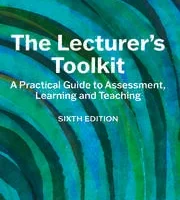
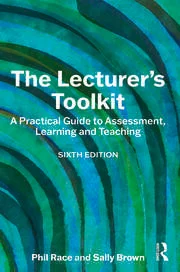

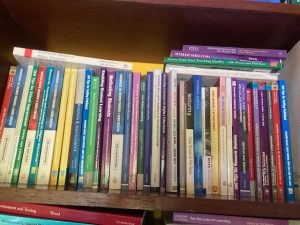
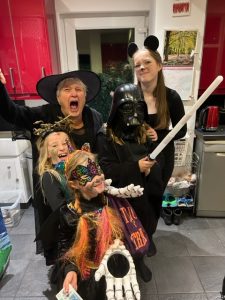
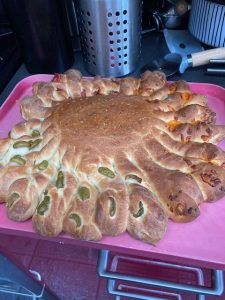
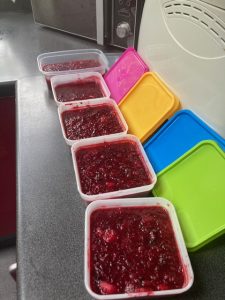
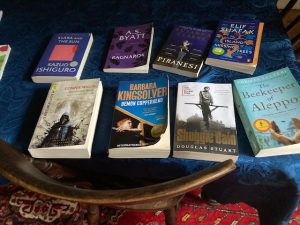
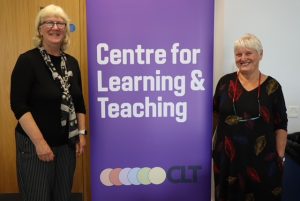
 Kay Sambell and Sally Brown
Kay Sambell and Sally Brown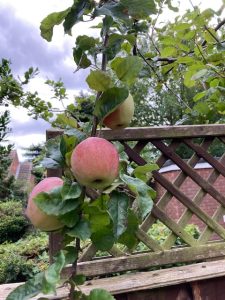 It’s a great time of year for mellow fruitfulness and my garden (and those adjacent) are full of apples and pears, and the blackberry harvest came early and has been good. We are just waiting now for the eating apples to finish ripening.
It’s a great time of year for mellow fruitfulness and my garden (and those adjacent) are full of apples and pears, and the blackberry harvest came early and has been good. We are just waiting now for the eating apples to finish ripening.
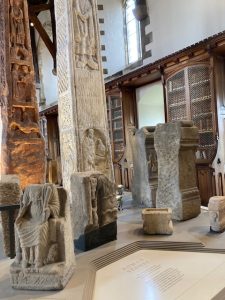
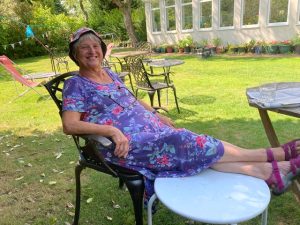 In this podcast, you can hear me talking about assessment with
In this podcast, you can hear me talking about assessment with 